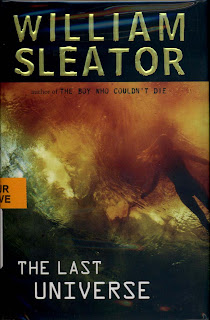
Summary & Evaluation: Susan's brother, Gary, used to ignore her all the time because he was too busy with sports and friends--but now he's forced to pay attention to her, because she pushes him around in a wheelchair, due to some mysterious illness that Gary's come down with. The illness isn't the only strange thing happening, however, as the haunting and palatial garden in their back yard begins to grow non-native lotuses and poppies overnight, birds appear from lotuses and garden paths lead to areas that they never lead to before--such as the hedge maze that can only be seen from the second story of the house, but the entrance could never be found. When Gary and Susan enter the maze, they realize that quantum physics is to blame for all of the strange happenings in the garden, and that the maze holds the chance that Gary's illness can be cured by finding an alternate universe made possible by quantum physics.
Some of the blurbs on the book's jacket refer to it as "creepy" and a "horror story" but I think this worked better as a sci-fi tale than as a horror story. That's because this book does what a really good sci-fi story should do--namely, involve actual science. The Last Universe uses quantum physics to drive the story's plot, where the teenage duo of brother and sister try to solve the mystery of the garden's maze and cure Gary's mysterious illness. While the book does have some haunting elements to it, such as the creepiness of the garden and the twist at the end (Susan comes back to the original universe to find that Gary has been cured but she now has the mysterious illness), the author works more on describing quantum physics than he does creating an eerie mood. All in all, it was a really fun read, especially for someone who likes more traditional sci-fi (or even quantum physics).
Booktalk Hook: If I were to booktalk this, I'd want to try and hook potential readers by asking them what they'd do if they could get to an alternate reality that was better than their current one, but in order to get there they'd have to run the risk of going to a reality that was worse than their current one. And what if they were dying, and knew it--would that increase the possibility they'd take the risk? Then I'd launch into a quick synopsis of the book.
Some of the blurbs on the book's jacket refer to it as "creepy" and a "horror story" but I think this worked better as a sci-fi tale than as a horror story. That's because this book does what a really good sci-fi story should do--namely, involve actual science. The Last Universe uses quantum physics to drive the story's plot, where the teenage duo of brother and sister try to solve the mystery of the garden's maze and cure Gary's mysterious illness. While the book does have some haunting elements to it, such as the creepiness of the garden and the twist at the end (Susan comes back to the original universe to find that Gary has been cured but she now has the mysterious illness), the author works more on describing quantum physics than he does creating an eerie mood. All in all, it was a really fun read, especially for someone who likes more traditional sci-fi (or even quantum physics).
Booktalk Hook: If I were to booktalk this, I'd want to try and hook potential readers by asking them what they'd do if they could get to an alternate reality that was better than their current one, but in order to get there they'd have to run the risk of going to a reality that was worse than their current one. And what if they were dying, and knew it--would that increase the possibility they'd take the risk? Then I'd launch into a quick synopsis of the book.


No comments:
Post a Comment